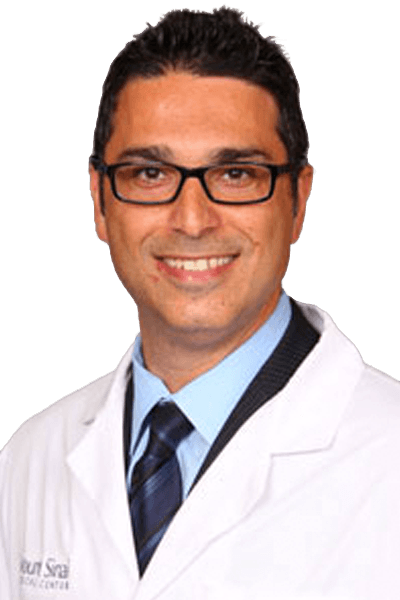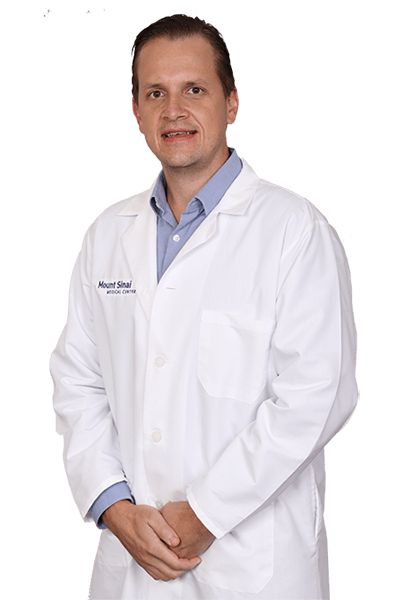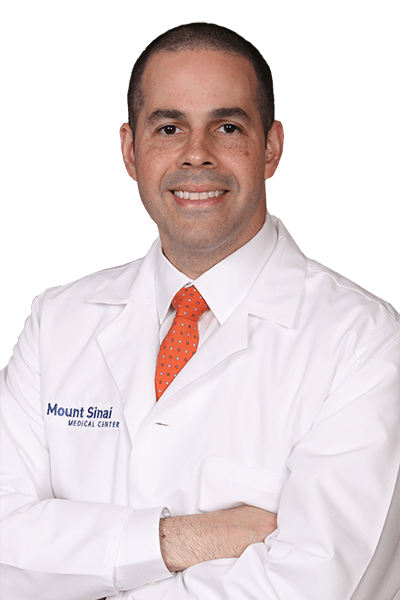Advanced Endoscopic Procedures
The Endoscopy Center at Mount Sinai Medical Center is one of the largest GI diagnostic and treatment centers in South Florida. We diagnose and treat gastrointestinal diseases and conditions using specialized endoscopy procedures – some of the most advanced procedures available.
Colonoscopy
This is a diagnostic test to see inside the colon, also known as the large bowel or large intestine. The colon is the part of your body that absorbs water from the food and drinks you take in, and it sends the water to your kidneys to be expelled as urine.
A colonoscopy is recommended if a patient has a change in bowel habit or bleeding, which may indicate a possible problem in the colon or rectum. It is also necessary to:
- Find out the reason for unexplained abdominal symptoms
- Find inflammatory bowel disease (colitis)
- Find polyps or tumors that were seen during an X-ray using barium
- Find out why there is blood in the stool
- Monitor patients with a past history of colon polyps or cancer
A colonoscopy is recommended as a potentially life-saving screening tool for colorectal cancer in all people age 45 and over.
To prepare for a colonoscopy, patients must clear out all stool from their colons. To do this, your Mount Sinai gastroenterologist will prescribe a special preparation that causes you to go to the bathroom until nothing remains in your colon.
The procedure itself is usually performed on an outpatient basis and takes less than an hour. Your doctor will give you a mild sedative to relieve anxiety and discomfort, and then a stronger anesthesia to put you comfortably asleep. While you’re sleeping, the doctor will insert a flexible scope with a camera at the end to look at your entire colon all the way to the point where it joins with the small intestine. In addition to examining the colon for any abnormal growths, inflammation, and diverticula (pockets in the lining of the colon), your Mount Sinai gastroenterologist can also take tissue samples during the colonoscopy, which can later be examined under a microscope. These are called biopsies. He or she may also remove any abnormal growths, or polyps, that have the potential to become cancerous.
Endoscopic Mucosal Resection (EMR)
This endoscopic technique allows your Mount Sinai gastroenterologist to resect, or remove, large polyps or precancerous tumors from the esophagus, stomach, duodenum, or colon. This technique is similar to traditional scopes, where a flexible tube with a camera is introduced through the mouth or the anus, allowing for removal of the lesions. This avoids surgery where it might be necessary to remove part of the organ where the lesion is located.
Endoscopic Retrograde Cholangiopancreatography (ERCP)
This is an endoscopic procedure that we use to evaluate and treat disorders of the bile ducts and pancreas.
Using a flexible tube with a camera and a light at the end, along with X-ray guidance, your Mount Sinai gastroenterologist can introduce special devices into the ducts of the liver and the pancreas through the natural opening located in the first part of the small intestine.
We use ERCP to diagnose strictures, which are narrowed segments of intestine, as well as to diagnose tumors of the ducts. We also use ERCP for treatment purposes, like placing stents to open up strictures, to remove calcified stones that sometimes form in the bile duct, and to treat complications from previous surgery of the bile ducts.
Endoscopic Ultrasound (EUS)
This procedure is similar to a regular upper or lower scope, but the camera has an ultrasound probe in the tip that allows your doctor to see beyond the GI tract to see the nearby structures like your lymph nodes, pancreas, gallbladder, and liver. This technology is used for both diagnostic and treatment purposes. Diagnostic EUS is used to stage esophageal and gastric cancers, as well as to detect pancreatic and biliary cancers.
During an EUS, your doctor can use a needle to take tissue samples from any tumors and lymph nodes that he or she sees without the need for major surgery.
From a treatment perspective, we use EUS to drain pancreas pseudocysts and to remove tissue that has died (necrosis). We also use EUS to treat gastric varices, or veins, access the bile ducts, and for gallbladder drainage. In addition, EUS has value to inject pain relief medication as a palliative tool for patients with pancreatic cancer.
Enteroscopy
The small bowel, also known as the small intestine, is very long and bendy, and it can’t be reached using traditional endoscopes. So, we use enteroscopy instead. This is a special procedure that uses a long, flexible camera, sometimes used in conjunction with an overtube attached to a balloon (balloon-assisted enteroscopy), that allows for deeper access of the small bowel. This intervention allows for diagnosing disorders of the small bowel, as well as for treating bleeding vessels that have caused anemia, and avoids the need for surgery.
Luminal Stenting
This endoscopic technique is utilized to open up an occluded, or blocked, esophagus, intestine, or large bowel. These are usually blocked from a malignant tumor. Luminal stenting is a minimally invasive technique that largely avoids the need for surgery, which could result in removal of the esophagus or part of the intestines.
Radiofrequency Ablation (RFA)
This endoscopic technique destroy precancerous lesions or tissue like in Barrett’s Esophagus using thermal energy. This technique prevents disease progression to cancer, and therefore avoids the need for surgical resection of the esophagus. It is also utilized to control bleeding of some stomach and rectal lesions that can arise in patients undergoing radiation, or those requiring radiation.
Our Physicians
Kfir Ben-David, MD
Roni Jacobson Endowed Chairman of Surgery
Program Director, General Surgery Residency
- Cancer
- General Surgery
- Surgical Oncology
- Robotic Surgery
- Bariatric
- Gastroenterology
- Mount Sinai Medical Center (Main Campus)
- 305.674.2397
- Mount Sinai Medical Center (Main Campus)
- 305.674.2240
Frank Czul-Gurdian, MD
- Gastroenterology
- Mount Sinai Medical Center (Main Campus)
- (305) 674-2240
- Mount Sinai Primary & Specialty Care Miami Shores
- (305) 891-3710
Manuel O Gonzalez, MD
- Gastroenterology
- Mount Sinai Emergency Center and Primary & Specialty Care Hialeah
- 786.584.5000





